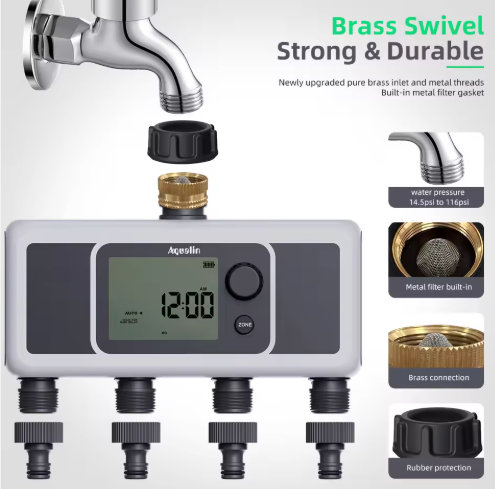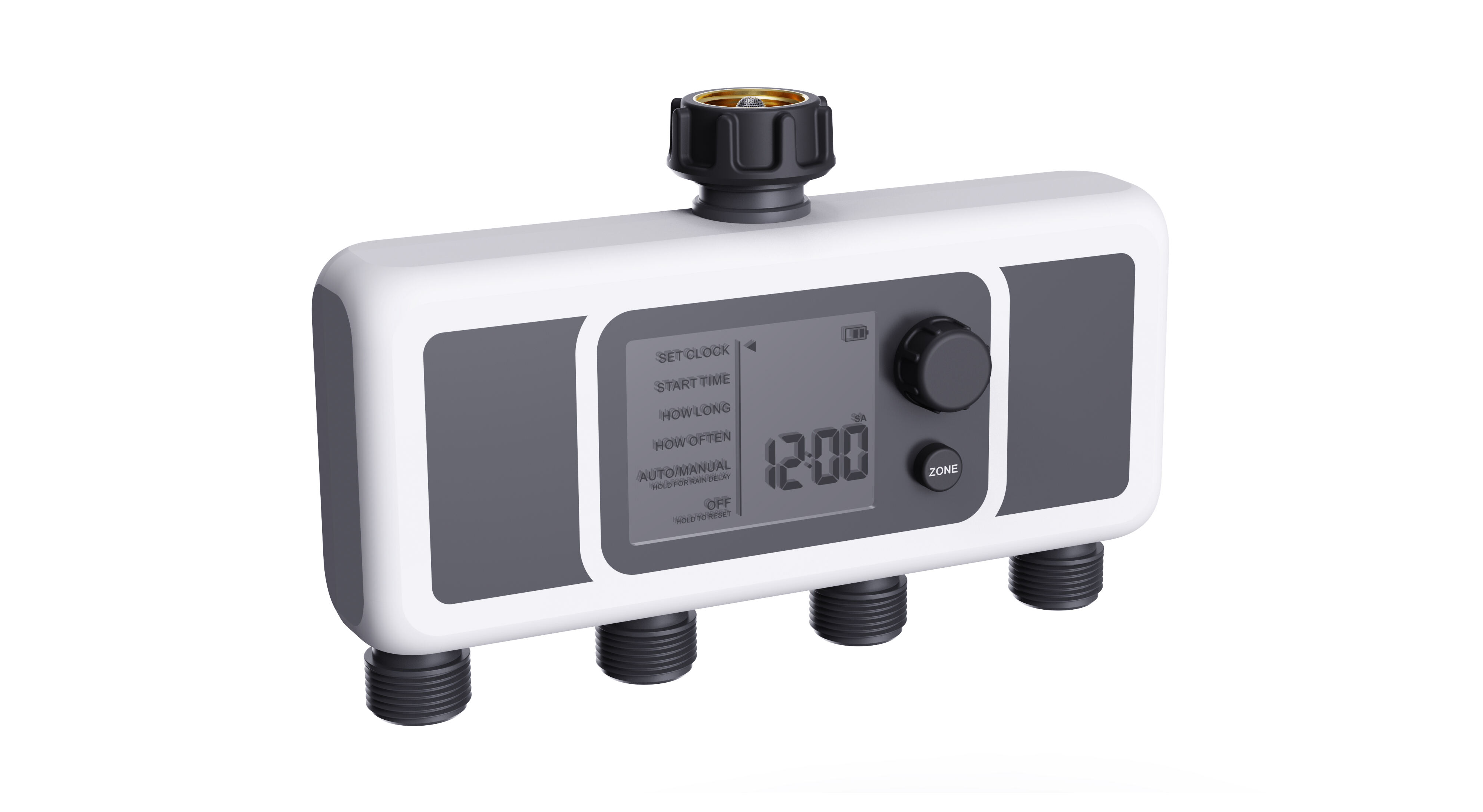スマート水管理ソリューションの進化
地球の水資源がますます貴重になる中、家庭および企業は効率的な水管理のための革新的なソリューションへと注目しています。 ウォータータイマー 持続可能な水利用を実現する画期的なツールとして登場し、灌漑や水 conservation のアプローチを変革する精度制御と自動スケジューリングを提供しています。これらのインテリジェントなデバイスは、現代の水管理システムの基盤を成しており、単なる利便性を超えて、環境的および経済的利益をもたらします。
現代の水用タイマーは、従来の手動による灌漑方法から大きく進歩したものです。高度な技術と使いやすいインターフェースを組み合わせることで、無駄や過剰灌漑を排除しつつ、正確な給水を実現します。灌漑システムに ウォータータイマー を導入することは、単に装置への投資ではなく、より賢く、責任ある水資源管理のアプローチを採用することを意味します。
水用タイマーシステム導入の主なメリット
保全と環境への影響
水栓タイマーは、水の使用パターンを最適化することで環境保護に重要な役割を果たします。これらの装置は、手動での散水方法と比較して最大50%まで水の消費量を削減でき、節水活動に大きく貢献します。正確なタイミング制御と制御された給水メカニズムにより、一滴の水も無駄なく効果的に使用され、流出を最小限に抑え、水の浪費を防ぎます。
即時の節水効果に加えて、これらのシステムは土壌の水分レベルを最適に保つのに役立ち、根腐れやカビ病などの過剰灌漑に起因する問題を防ぎながら、植物の健全な成長を促進します。このバランスの取れたアプローチは、水の節約だけでなく、より持続可能な景観や庭園の実現にもつながります。
コスト効率とリソース管理
水栓タイマーの設置は的確な財務投資となることが証明されており、多くのユーザーが導入後数か月以内に水道料金が大幅に削減されたと報告しています。水栓タイマーの初期費用は、正確な水量管理と消費量の削減によって得られる節約効果により、短期間で回収されます。さらに、これらの装置は過剰灌漑による建物や敷地への高額な水害を防ぐのにも役立ちます。
専門のランドスケープデザイナーや不動産管理者は特に水栓タイマーの恩恵を受けます。複数の灌漑ゾーンを効率的に管理しつつ、詳細な使用記録を維持することで、リソースのより適切な配分が可能になるからです。季節の変化や気象条件に応じて灌漑スケジュールを調整できるため、年間を通じてリソースを最適に活用できます。

最新式水やりタイマーの高度な機能
スマート テクノロジーの統合
今日の水栓タイマーは、単なるスケジュール設定を超える機能を高める最先端技術を取り入れています。多くのモデルにはWi-Fi接続機能が備わっており、ユーザーはスマートフォンアプリを通じて灌漑システムを遠隔で制御・監視できます。これらのスマート機能により、リアルタイムでの調整、システム異常時の即時通知、詳細な給水使用量の分析が可能になります。
高度な水栓タイマーは気象予報サービスとも連携でき、現在の天候状況や予報に基づいて自動的に watering スケジュールを調整します。このインテリジェントな適応により、自然降雨に応じて灌漑システムが適切に対応し、湿潤期間中の不要な散水を防ぎます。
カスタマイズおよびプログラミングオプション
現代の水栓タイマーは、特定の灌漑ニーズに対応するための前例のないカスタマイズ性を提供します。ユーザーは異なる植物の種類、土壌状態、日当たりに応じて、個別のスケジュールを持つ複数の灌水ゾーンを作成できます。各ゾーンの灌水時間と頻度を微調整できるため、最適な生育環境を維持しつつ、水の効率的な使用が可能になります。
高度なプログラミング機能により、季節による調整、繰り返し灌水と浸透機能、さらには土壌水分センサーとの連携が可能です。これらの機能により、水栓タイマーは必要なときに正確な量の水を供給でき、植物の健全な成長を促進するとともに、水の無駄を防ぎます。
インストールとメンテナンスに関する考慮事項
プロフェッショナルなセットアップと統合
多くの水栓タイマーはDIY設置向けに設計されていますが、専門業者による設置を行うことで、最適な性能を発揮し、既存の灌漑システムとの円滑な統合が可能になります。経験豊富な設置業者は、ゾーン設定を適切に構成したり、システムの圧力をテストし、適切な散水範囲を確認することができます。また、特定の敷地条件に応じて効率を最大限に高めるためのプログラミング戦略についても、貴重なアドバイスを提供できます。
専門業者による設置には、潜在的な問題点や改善の機会を特定する包括的なシステム評価が含まれることが多いです。この能動的なアプローチにより、将来の問題を未然に防ぎ、水栓タイマーシステムが初日から最高の効率で動作することを保証します。
長期的なメンテナンスと最適化
水栓タイマーシステムの定期的なメンテナンスは、持続的な性能と長寿命を確保するために不可欠です。これには、タイマー設定の定期的な点検、必要に応じた電池交換、フィルターの清掃などが含まれます。 センサー 季節に応じて天候の変化や植物の水分要求量の変動を考慮し、調整を行うべきです。
多くの現代的な水栓タイマーには診断機能が備わっており、問題になる前に潜在的な不具合を特定できます。システムの動作状況や給水パターンを定期的に監視することで、灌水スケジュールや設定の継続的な最適化が可能になります。
よく 聞かれる 質問
水栓タイマーを使用すると、どのくらいの水を節約できますか?
多くのユーザーは、水栓タイマーを設置した後、節水率が30%から50%程度になると報告しています。正確な節水量は、それまでの灌水習慣、敷地の広さ、および地域の気候条件などの要因によって異なります。天気情報と連携するようなスマート機能があれば、さらに節水効果を高めることができます。
停電時、水やりタイマーはどうなりますか?
最新の水栓タイマーのほとんどには、停電時でもプログラムやタイマー設定を維持するためのバッテリー式バックアップシステムが搭載されています。このバックアップ用バッテリーは通常数か月から1年程度持ち、長期間の停電中でも継続的な運転を保証します。
水栓タイマーは複数の灌漑ゾーンを管理できますか?
はい、現代の水栓タイマーは複数のゾーンを個別に管理できるように設計されています。高性能なモデルでは4〜16以上ものゾーンを制御でき、それぞれにカスタマイズされた watering スケジュールと給水時間の設定が可能です。これにより、異なる給水ニーズを持つ多様な庭園エリアに対して正確な水管理を行うことができます。


